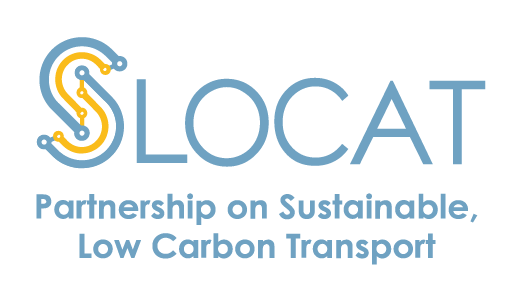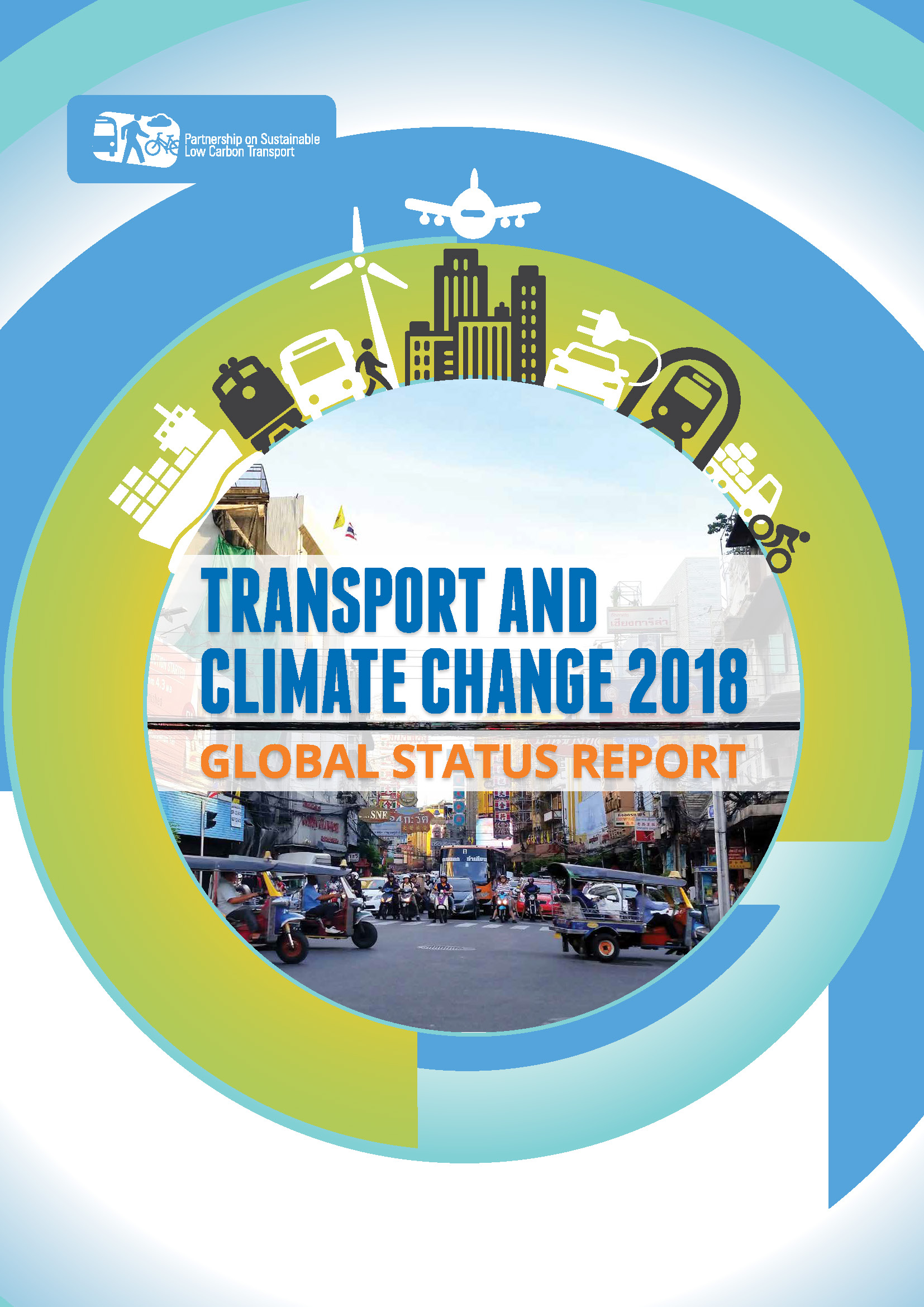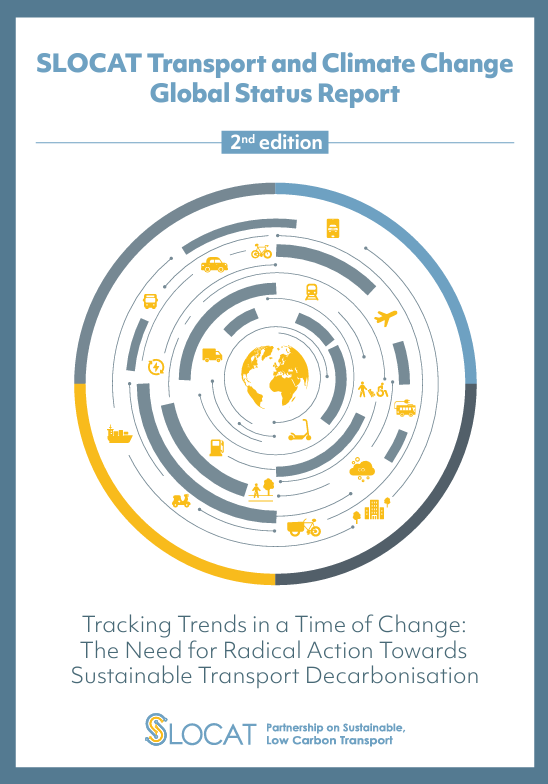About the Report
The SLOCAT Transport, Climate and Sustainability Global Status Report – 3rd Edition tells the global and regional stories of where we are and where we need to get to urgently on climate and sustainability action for transport and mobility. With contributions from 100 world-class experts and organisations, this flagship report is a one-stop shop for the latest available data, trends, targets and developments on transport demand, emissions and policies. The GSR equips decision makers towards knowledge-based action and aims to raise ambition in transport policy and investment for people and the planet.
The report consists of 5 thematic modules covering 12 transport areas: integrated transport planning, walking, cycling, public transport, informal transport, app-driven shared transport, rail, road transport, aviation, shipping, transport energy sources, and vehicle technologies. It includes 5 spotlights on cross-cutting issues (global supply chains, health, small island developing states, capacity building and stakeholder engagement in the United Nations Framework Convention on Climate Change) as well as 30 country fact sheets. An updated version of the open-source SLOCAT Transport Knowledge Base that forms the basis of the report was released along with the full report.
New for this edition, the report was released in a modular approach from June to September 2023, which synthesises knowledge and data more systematically and helps our readers comprehend specific issues more effectively. The full report was launched at Germany’s Transport and Climate Change Week 2023 on 13 September 2023.
This edition has been made possible thanks to financial support by Deutsche Gesellschaft für Internationale Zusammenarbeit (GIZ), supported by the German Federal Ministry for Economic Affairs and Climate Action (BMWK) through their International Climate Initiative (IKI) and by the Volvo Research and Education Foundations (VREF).
How to navigate this report
Modular approach:
While the report and modules can be downloaded as a single file and read from start to finish, sections of interest can also be accessed individually via this website.
Structure:
The report is divided into five main modules. Sources for the information provided are listed at the end of each module, and cross-references among modules are included where relevant. The five main modules are as follows:
Takeaways for Decision Makers
This document outlines a critical overview of key trends, challenges and opportunities in the intersection between transport, climate and sustainability. It aims to provide food for thought and action in support of decision makers interested in advancing the transformation towards sustainable, low carbon transport.
1. Transport Pathways to Reach Global Climate and Sustainability Goals
- 1.1. Transforming Transport and Mobility to Achieve the Targets of the Paris Agreement and the Sustainable Development Goals
- 1.2. Transport Adaptation and Resilience
- Spotlight 1. Transport-Health Nexus
- Spotlight 2. Transport Adaptation and Decarbonisation in Small Island Developing States
- 1.3. National and Subnational Action for Sustainable, Low Carbon Transport
- 1.3.1. National Climate and Sustainability Strategies to Achieve the Targets of the Paris Agreement and the SDGs on Transport
- Spotlight 3. Transport Stakeholders Engagement in the United Nations Framework Convention on Climate Change process
- 1.3.2. Subnational Actions for Sustainable, Low Carbon Transport
- 1.3.3. The Role of Business in Decarbonising Transport
- Spotlight 4. Shortening Global Supply Chains as a Key to Decarbonising Transport
2. Regional Transport and Climate Change Trends
- 2.1. Africa Regional Overview
- 2.2. Asia Regional Overview
- 2.3. Europe Regional Overview
- 2.4. Latin America and the Caribbean Regional Overview
- 2.5. North America Regional Overview
- 2.6. Oceania Regional Overview
3. Responses to Address Climate Change in the Transport Sector
- 3.1. Integrated transport planning
- 3.2. Walking
- 3.3. Cycling
- 3.4. Shared Mobility
- 3.4.1. Public Transport
- 3.4.2. Informal Transport
- 3.4.3. App-Driven Shared Transport
- 3.5. Rail
- 3.6. Road Transport
- 3.7. Aviation
- 3.8. Shipping
4. Transport and Energy
- 4.1. Transport Energy Sources
- 4.2. Vehicle Technologies
5. Enabling Climate Action in Transport: Finance, Capacity, and Institutional Support
- 5.1. Financing Sustainable Transport in Times of Limited Budgets
- Spotlight 5. Capacity and Institutional Support to Achieve Sustainable, Low Carbon Transport
Country Fact Sheets
30 country fact sheets were developed for countries that had the highest absolute transport carbon dioxide (CO2) emissions in 2021. These fact sheets present data on transport demand, emission trends and measures taken at the national level towards achieving a decarbonised, sustainable transport system. Among the 30 countries covered, 8 are in Africa (Algeria, Egypt, Ghana, Libya, Morocco, Nigeria, South Africa and Sudan), 7 are in Latin America and the Caribbean (Argentina, Brazil, Chile, Colombia, Mexico, Peru and Venezuela), 6 are in Asia (China, India, Indonesia, Iran, Japan and Saudi Arabia), 5 are in Europe (France, Germany, Italy, the Russian Federation and the United Kingdom), 2 are in North America (Canada and the United States) and 2 are in Oceania (Australia and New Zealand).
Previous Editions
About the SLOCAT Partnership

SLOCAT is the international, multi-stakeholder partnership powering systemic transformations and a just transition towards equitable, healthy, green and resilient transport and mobility systems for the people and the planet. We deliver on our mission through co-creation, co-leadership and co-delivery across knowledge, advocacy and dialogue activities in the intersection between transport, climate change and sustainability. Our multi-sectoral Partnership engages a vibrant and inclusive ecosystem across transport associations, NGOs, academia, governments, multilateral organisations, philanthropy and business; as well as a large community of world-class experts and change-makers. Going where others do not or cannot go individually, our Partnership is leveraged to set ambitious global agendas and catalyse progressive thinking and solutions for the urgent transformation of transport and mobility systems worldwide.
Disclaimer
SLOCAT releases issue papers and reports to enable collaborative knowledge and action for sustainable, low carbon transport. While SLOCAT papers and reports have benefited from the considerations and input from the SLOCAT community, they do not necessarily represent a consensus among network participants on any given point. Although the information given in this report is the best available to the authors at the time, SLOCAT and its participants cannot be held liable for its accuracy and correctness. The designations employed and the presentation of material in the maps in this report do not imply the expression of any opinion whatsoever concerning the legal status of any region, country, territory, city or area or of its authorities, and is without prejudice to the status of or sovereignty over any territory, to the delimitation of international frontiers or boundaries and to the name of any territory, city or area.

